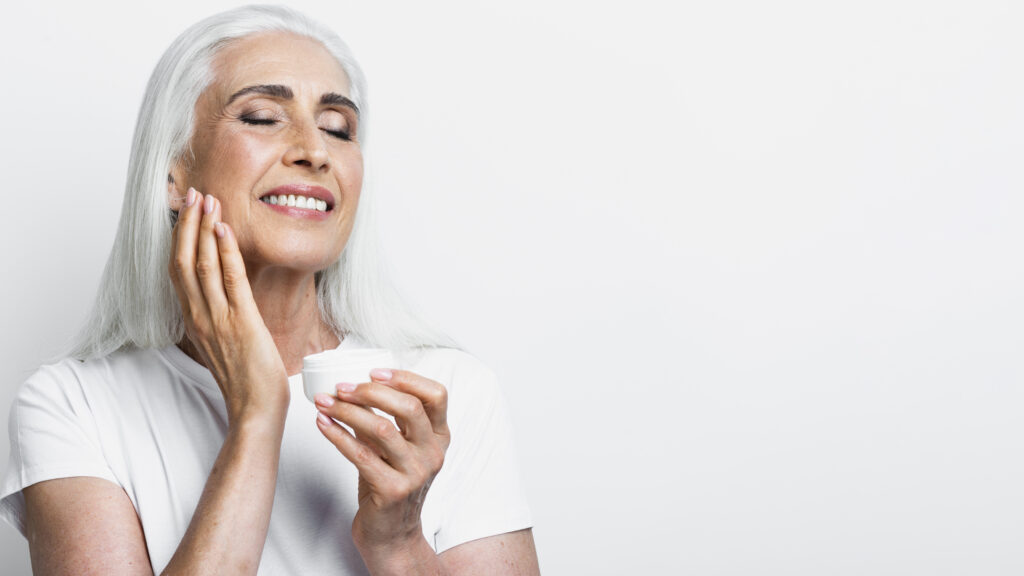The skin’s health declines as we age for several reasons, including our way of life, food, genetics, environmental exposure, habits, and even how we sleep. Age adds complexity to this, as it does to other aspects of physical care: Studies reveal that dryness, itching, and flaws may affect the skin as early as 40.
The signs of aging may often be seen first on the skin. Drying, thinning, and a diminished capacity for repair are all effects of aging skin.

What You Should Know About Skin Aging
The skin’s protective role gets underestimated often. However, the skin’s role as a protective barrier is crucial. Essential activities like regulating body temperature and sensation are performed by its underlying tissues (nerves, blood vessels, hair follicles, oil and sweat glands).
Aging skin has a lower resistance to damage because its cell renewal rate decreases. Collagen and elastin formation slows down, and the dermal glands’ capacity to keep the skin moist diminishes.
Therefore, the following skin changes are prevalent in the latter years of life:
- Easily irritated or more sensitive skin.
- More prone to sustaining bruises.
- Becomes more susceptible to being bruised.
- Heals at a slower rate.
- Dry skin.
- Thinner and beginning to appear paper-like.
- Itchiness on the surface of the skin.
- Wrinkles, creases, and age spots.
This article will explore numerous simple strategies to enhance your skin’s look and overall well-being.
Maintaining a Healthy Skin as We Age
Understanding the best skin care regimen is complicated, with a new generation of influencers flooding the internet and new products entering the market constantly. Here are some simple tips to help you bring shine to your skin:
1) Regular moisturizing is essential for healthy skin.
Use a body moisturizer after getting out of the shower or bath to prevent your skin from losing moisture. Dry, sensitive skin might benefit from a thicker ointment or cream, which may be less irritating and provide greater comfort. To keep your skin hydrated, look for substances like dimethicone, glycerin, mineral oil, or hyaluronic acid.
Don’t forget about your face as well. Moisturize your face using a product formulated for dry, oily, or combined. Choose an occlusive moisturizer to build a barrier that seals moisture and stops water loss.
TIP: It is recommended that older adults “establish their skin’s protective barrier” by applying moisturizer within three minutes after washing their faces and bodies. Serums, retinol, and antioxidant creams may help aging skin with more hydration.
2) Keep your skin safe from the sun’s harmful effects.
Sun damage causes the skin to age prematurely and leads to the development of wrinkles and fine lines. Broad-spectrum sunscreens, which block UVA and UVB rays, are among the market’s most effective skin protection products. If you go outdoors, shield yourself from the sun by wearing a hat with a broad brim and a pair of sunglasses.
3) Take in plenty of fluids and stay hydrated.
Many dermatologists suggest that adequate water intake will help prevent skin conditions, including psoriasis and eczema. It is accomplished by removing harmful toxins from the digestive tract. It will improve your complexion for healthy and glowing skin.
Staying hydrated benefits both skin and general health, so it’s essential not to overlook its importance.
4) Maintain a regular and straightforward routine.
Experts in skin care stress the importance of keeping skincare routines simple. Irritation might occur if you scrape, exfoliate, or use products too often.
To avoid further skin dryness, always use a mild cleanser that does not include alcohol or perfume. For instance, retinoids and alpha-hydroxy acid, an ingredient in several anti-aging creams, should be avoided since they might irritate the skin.
5) A well-balanced diet contributes to beautiful and healthy skin.
When it comes to the skin’s well-being, the old saying “you are what you eat” has never been more true. The food we consume directly affects our skin’s health, so it’s crucial to focus on getting enough of the proper nutrients, vitamins, antioxidants, and essential minerals.
Maintaining good skin may be as simple as eating more leafy greens, berries, melons, avocados, walnuts, and oily fish like salmon. Adding these foods to a healthy, well-balanced diet may help your skin stay healthy as you age.
6) Maintain a healthy lifestyle.
It’s essential to nourish the skin from the inside out. Spending much on anti-aging treatments may not provide the best results if you aren’t taking care of your health.
Take proper care of your body, get enough sleep, surround yourself with people you care about, and do what brings you joy. In the end, wrinkles, fine lines, and age spots are all signs that you are getting older. Wear them with confidence!
Final Thoughts
As we get on in years, our body goes through many changes, especially our skin. The skin is the body’s first line of protection, and its significance is not to be taken lightly. Keep in mind that things within your control can guarantee that they will continue to be healthy. Following the tips above can help you maintain youthful and radiant-looking skin.
Tita Homecare Can Help You Maintain a Healthy and Active Lifestyle
Seniors may keep their skin healthy and continue to enjoy life with the aid of our professional and compassionate caregivers. We can help plan a well-balanced diet for you or your loved ones and assist in doing routine exercises. You may check the services that we offer by clicking here or you may contact us directly.
Image by Freepik